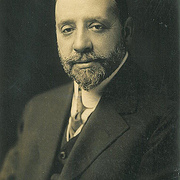Morris Jastrow, Jr. (1861–1921)
Auteur de An Old Babylonian Version of the Gilgamesh Epic
A propos de l'auteur
Séries
Œuvres de Morris Jastrow, Jr.
The civilization of Babylonia and Assyria; its remains, language, history, religion, commerce, law, art, and literature (1915) 21 exemplaires
The War and the Bagdad Railway, the Story of Asia Minor and Its Relation to the Present Conflict. (2007) 6 exemplaires
Zionism and the Future of Palestine: The Fallacies and Dangers of Political Zionism (1919) 5 exemplaires
The book of Job When the Morning Stars Sang Together 1 exemplaire
The Sacred Books and Early Literature of the East 1 exemplaire
Bildermappe mit 273 abbildungen samt erklärungen zur religion Babyloniens und Assyriens, besonders im anschluss und… 1 exemplaire
Die Religion Babyloniens und Assyriens. 2,1, 1912 1 exemplaire
Die Religion Babyloniens und Assyriens. 2,2, 1912 1 exemplaire
Oeuvres associées
Étiqueté
Partage des connaissances
- Nom canonique
- Jastrow, Morris, Jr.
- Date de naissance
- 1861-08-13
- Date de décès
- 1921-06-22
- Sexe
- male
- Nationalité
- Poland (birth)
USA (residence) - Lieu de naissance
- Warsaw, Poland
- Lieu du décès
- Jenkintown, Pennsylvania, USA
- Lieux de résidence
- Philadelphia, Pennsylvania, USA
- Études
- University of Pennsylvania (BA|1881)
University of Leipzig (Ph.D|1884)
Sorbonne - Professions
- orientalist
Professor of semitic languages
librarian - Relations
- Jastrow, Marcus (father)
Jastrow, Joseph (brother) - Organisations
- American Oriental Society
University of Pennsylvania
Membres
Critiques
Prix et récompenses
Vous aimerez peut-être aussi
Auteurs associés
Statistiques
- Œuvres
- 25
- Aussi par
- 1
- Membres
- 192
- Popularité
- #113,797
- Évaluation
- 3.8
- Critiques
- 2
- ISBN
- 59
- Langues
- 2












This book goes far beyond that. The appendix at the end lists about ninety different insertions, some of them of one or two words (glosses which are surely too short to identify clearly), some of them lasting for many verses (including even the larger part of the famous poem about a time and season for everything).
I can't help but think that this goes too far. Jastrow's analysis of the personality of Koheleth ("The Preacher") is probably mostly correct, but the literary analysis is simply too nitpicky. In many ways, this is an interesting book. But I would far rather see a commentary on Ecclesiastes-as-canonized than on Ecclesiastes-as-edited-by-Jastrow. Even if Koheleth did not write that there is a time to weep and a time to laugh, surely it is a point worth remembering!
And I do think that Jastrow sometimes gets things wrong, too. Take the thesis of the entire book: "Vanity of vanities, all is vanity." (An incredibly difficult phrase to translate -- in the Hebrew, the word means something like "mist" or "vapor" -- something as light as air, that mixes in air, that cannot be separated from air. But "Vapor of vapors, all is vapor" doesn't really get the point across. "Vanity of Vanities" -- nothing of nothings, but a thing on which we dote -- translated the feeling if not the words.) In the actual Hebrew text it opens the book, and it also closes the book except for all those silly accretions at the end. And yet Jastrow cuts it out at the beginning, thinking Koheleth saved it for the end as a summary. Yes, it's a summary, but it's also Koheleth's thesis. It needs to be at the beginning. And, in Jastrow's text, it isn't. That really is one edit too many.… (plus d'informations)